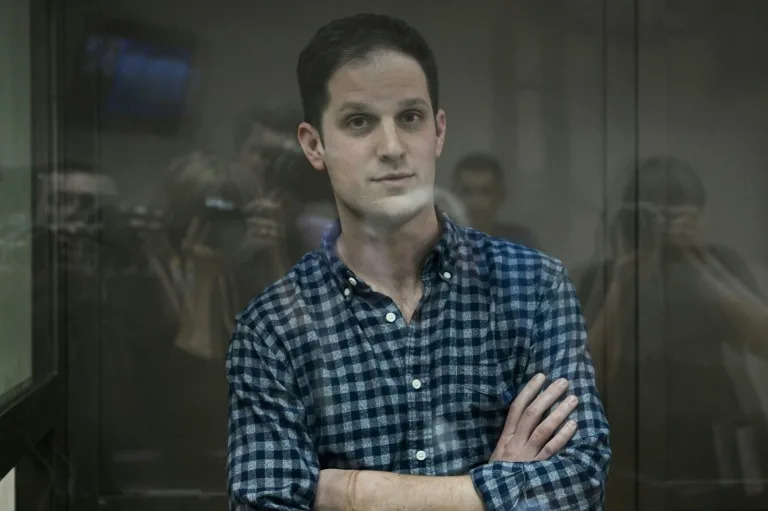In six years of work in Russia, imprisoned American reporter Evan Gershkovich forged a reputation as an all-rounder journalist, determined despite the risks to tell the story of a country transformed by the conflict in Ukraine.
Accused of espionage, a charge he vigorously denies, the Wall Street Journal correspondent, detained since the end of March, faces 20 years in prison in an unprecedentedly serious case against a foreign journalist.
The 31-year-old reporter is appearing Tuesday in an appeal hearing of his pre-trial detention.
Unlike many other American journalists who left Russia after the offensive began in Ukraine, Evan Gershkovich, the son of Soviet emigrants, decided to continue working on Russian soil.
Thus, this perfectly Russian-speaking reporter multiplied the articles in which he told how Russians live the conflict, and met with the relatives of dead soldiers and with detractors of President Vladimir Putin.
“I do not lose hope,” he said in a letter addressed to his parents from Lefortovo prison, and published by the WSJ.
According to his mother, Ella Milman, interviewed by that newspaper, Evan decided to continue his work in Russia despite the risks, because he saw it as a “duty” to continue writing about an increasingly closed country.
At the time of his arrest in Yekaterinburg, in the Urals, he appeared to be working on the arms industry and the Wagner paramilitary group. The indictment is under secrecy, so it is impossible to know at this stage what exactly he is accused of.
The Kremlin limited itself to saying that he was caught “in flagrante delicto” of espionage, but without giving further details.
His friends maintain that Evan Gershkovich was doing his job, beyond the fact that he knew that the FSB, the Russian secret service, had him on its radar.
“He knew he had been followed (by the security services), because of some articles, and that some of the people he spoke to could be subject to pressure,” Pjotr Sauer, a journalist with the British newspaper The Guardian, tells AFP.
“But I don’t think he saw this coming,” his arrest, he adds.
And it is that for Evan Gershkovich, as for other Western journalists in Russia, the accreditation handed out by the Russian Foreign Ministry seemed sufficient protection.
– “Extremely sociable” –
Before the conflict, the journalist, originally from New Jersey, stood out for his determination to write about Russia, the country of his roots, and of which he knew the rules and superstitions through his parents, Soviet Jews who fled there in the 1970s.
With a degree in English and philosophy, Evan decided to take the opposite route and settle in Russia.
In 2017, he left a job as an editorial assistant at the New York Times to join the Moscow Times, the capital’s leading English-language media outlet.
For about four years he chronicled the repression of the opposition, ecological catastrophes, the ravages of covid or Russian traditions, such as the art of “bania,” the Russian sauna he frequented.
“He has always been extremely curious about life, about what is going on around him, and extremely sociable,” lists Pjotr Sauer.
When he joined AFP’s Moscow bureau at the end of 2020, he continued in that vein, telling the story of a Russian opposition campaigner from prison, for example, or the day-to-day life of firefighters facing major fires in Siberia.
In early 2022, by joining the Wall Street Journal, Evan Gershkovich fulfilled his dream as a journalist: to work for one of the most renowned newspapers in the United States.
Also during this time, Evan was also enlightened by his sense of humor.
In a letter to his parents, he said that his mother’s cooking had prepared him “for the best or the worst in prison,” referring to gruau, a very hearty and inexpensive dish served in Russian homes as well as in prison cells.

